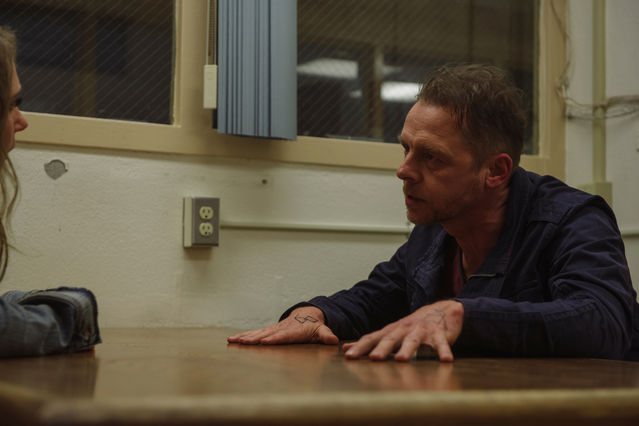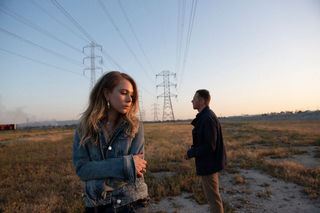Psychopharmacology
A Portrait of Schizophrenia: Simon Pegg and Katharine O'Brien on "Lost Transmissions"
The actor and director explain how they approach mental illness in a new film.
Posted March 13, 2020

A string of unnerving moments in Lost Transmissions makes it clear that the bottom is about to fall out. Theo, a buoyant musician (played by Simon Pegg) eager to draw out the creativity of his reserved new friend Hannah (Juno Temple) is suddenly laser-focused on something else—messages he says he hears coming through the car radio, just beneath the static.
Theo has schizophrenia and has gone off his medication, triggering a flood of delusions and erratic behavior. The ensuing episode tries the patience of his longtime friends as Hannah struggles to keep him close and find him help. Pegg, the star of sharp comedies like Shaun of the Dead and Hot Fuzz who's appeared in Star Trek and other blockbusters, imbues Theo with warmth and charisma without blunting the severity of his downward turn.
Director and screenwriter Katharine O’Brien channeled her personal experience with individuals who have a history of mental illness into the creation of the film, which premiered at Tribeca Film Festival last year and opens digitally and in New York and Los Angeles theaters today.
The actor and the filmmaker spoke with PT about how they sought to keep the story grounded. The following are edited excerpts of the interview.
Portraying a character with severe mental illness seems like it can be perilous, because you want to be certain to represent it faithfully. How did you handle that challenge?
Katharine O'Brien: I had so much personal experience with it growing up that I felt that I could speak about it fairly accurately. My grandmother is schizophrenic, so it was something that I encountered all throughout my childhood. Although, when I was growing up, it was undiagnosed. We sort of referred to grandma as crazy and mean, but never as sick. It took many years until we could get her a diagnosis because she was very functional—she ran a successful business in Santa Barbara. But the things that she would say, people would internalize, and it affected their self-worth.
I also encountered mental illness several times in various friend groups. When I encountered it with a particular friend of mine, there was just a lot more discussion of it, and I was really impressed by the way that people rallied together. It was something that I realized I wanted to tell a story about.
So his experience became the model for Theo's in the film?
O'Brien: It did. My friend had since recovered and was in a position, because his medication works extremely well, that he was able to reflect on his situation with unusual clarity. And we felt like that was a real gift and we could turn it into a positive, a way to help people. I spoke with him at length about what his experiences were, what his delusions were, what he was thinking at that time. It was very important to him that we got his delusions right in the film—for instance, him being pursued through time by this group of assassins called the Feather. He is a very funny guy, and a lot of these, in retrospect, were very humorous things that he'd say.
There were certain things that we did take creative liberties on, and we discussed that with him, too. Because we needed to dramatize it, we made the decision that the character Theo would be more vocal about [his experience]. And we tied a little bit more into transmissions and sounds and things that would be easy to convey through the assets that film has to offer, like sound design and music, to help portray the condition.
Elements of Theo’s delusions do have a sort of dark humor to them, yet Simon's performance clearly conveys their direness. Simon, how did you approach the role?
Simon Pegg: I think mental health issues are still something actors sort of approximate rather than portray faithfully. I wanted to do my research and get everything right. I spoke to the person the film was based on at length, which was really helpful because, as Katharine said, he had a very clear, objective view of his delusions. I also met up with a former carer of his, and he introduced me to some schizophrenic patients—one of whom was in recovery and one of whom was still in the midst of a schizophrenic break—and that was enlightening. I read as much as I could and watched documentaries.
I feel like schizophrenia is always mischaracterized as being some sort of split-personality disorder, and it's not that at all. Mental health issues are seemingly still fair game for hyperbole and flippancy, a kind of health condition which seems to be OK to make jokes about. People don't make so many jokes about cancer. So I wanted to make sure that I wasn't playing it in a way that felt flippant or comic.

One theme of the film is the ambivalent or even hostile relationship that some people have with the psychiatric medication that they're prescribed. Are there particular questions or issues you wanted to raise?
O'Brien: There are side effects of these medications, and they're not a complete cure-all. One experience that we had in making this film was that my friend was able to reflect on it and sort of accept his responsibility, realizing that he has to live with the side effects—when he goes off his medication, it has all these repercussions for his friends and family.
I think that the film represents how medication functions for all kinds of people. Obviously, Theo is somebody who really needs to be on medication, and it helps him. But there are a lot of people who are on other types of medication. Hannah is in a situation where she might have been over-prescribed something, or it was appropriate for a certain point in her youth, but maybe she doesn't need it anymore. The film is not didactic, but it's really a discussion of the ongoing negotiation that people go through.
Pegg: Also, I think the whole idea of medication as the sole solution—it can be, but talk therapy and re-evaluations of your mental health are also really helpful so that you know that you're still on the right track.
The film also drives home the importance of social ties during a mental health crisis—especially when, for Theo, those ties start to fray. Did tensions in your own friend group inform that story?
O'Brien: Hannah is meant to reflect a number of people who have kind of been combined into one person to better represent all of our experiences. It was fairly fraught. It was upsetting, and a lot of people had varying opinions on how to handle it. A lot of people have been pushed and tested, and there is a question of how long people feel obligated to stay and help and when they have to attend to their own lives, which is a totally fair question. What I've come to feel about it is that it really is a great burden for any individual or family, and often they just don't have the resources. So that's where it really helps to have the state step in and to have facilities with staff who are trained and know how to handle this.
Simon, what attracted you to this particular story and role?
Pegg: I was very flattered to be offered the role just because, as an actor doing the things I've done, I tend to get offered a certain type of role—and this was not it. I really liked the story, and I really loved Theo as a character. I love playing characters that have complex inner workings and try to suppress that, so a lot of the time, you're sort of acting internally.
Has the friend who inspired the film seen it?
O'Brien: Yeah. He was involved throughout, and he was very moved when he saw it. It made him more aware of everybody else's experience around him and more sensitive to it. By him sharing his story, it's made the burden of it lighter. Keeping it as a secret in your life, it tends to grow, and this way, when everybody talks about it, the weight of it sort of evaporates.
The film hints at the interaction between Theo's mental illness and his creative work as a musician and producer.
O'Brien: There's one scene in particular where Theo, who is off his medication, is mixing a band’s recordings, and at first it sounds really amazing, and then it quickly falls apart. And that's sort of meant to say that he does benefit from being on medication, and it's not following the myth that you get great art out of madness.
That being said, I think that we're all well aware of a lot of great musicians and artists who have been in pursuit of this edge that would help them see reality a little bit differently from everybody else and offer some new perception, and that's really what art is. To me, it's all a question of finding balance. And that's something that Hannah's character is able to find in the film. She learns how to push herself for inspiration but still stay on the ground and not fall off that ledge.
Pegg: There's a lot of sort of romanticism around the idea of madness and art. And really, the great artists who have suffered from mental health issues have achieved their artistic vision in spite of it, not because of it. I don't think that Van Gogh was a great artist because he was bipolar. He happened to be bipolar and suffered greatly because of it; he also happened to make great art. They're not necessarily a product of each other.




